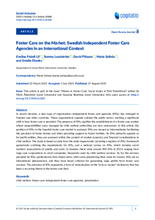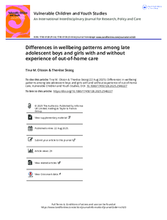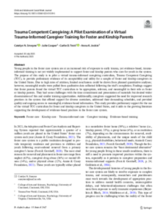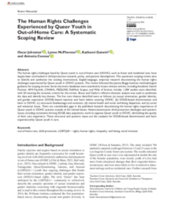Displaying 11 - 20 of 2221
This article examines the rise of independent foster care agencies (IFAs) in Sweden, which have introduced a market-based model into a system once managed solely by child welfare authorities. Drawing on national data and social worker perspectives, it explores the benefits, costs, and controversies of IFAs, including concerns about profit-making in foster care.
This study explored wellbeing among Swedish adolescents with and without out-of-home care experience, using cluster analysis of 10 wellbeing indicators. It found two distinct groups—one with higher wellbeing and one with lower wellbeing—with girls, unemployed youth, and those with care experience more likely to fall into the reduced wellbeing cluster.
This article examines how foster parents in Sweden navigate and reproduce public suspicions about financial compensation, drawing on texts and interviews from a three-year research project. While payments are essential for recruitment amid a shortage of foster families, foster parents face sensitivity, suspicion, and blame, leading them to develop strategies to deflect questions and avoid stigma.
This study piloted a virtual trauma-informed caregiving curriculum, Trauma Competent Caregiving (TCC), to assess its acceptability and usefulness for foster and kinship caregivers in the United States. Despite high attrition, qualitative findings indicate that caregivers found the curriculum relevant and meaningful, though they noted challenges with time demands and called for broader access to similar evidence-based training.
Integrated healthcare models combining behavioral and primary care provide solutions for vulnerable pediatric populations, especially youth in foster care, facing disproportionately high rates of chronic conditions and mental health issues. This review synthesizes current literature to assess the impact of integrated care on health outcomes for youth in foster care in the U.S..
This study explores how trust is built within the Mockingbird Family foster care model in Australia, based on interviews with children, carers, and care networks. Findings show that trust emerges through daily interactions, collaboration, and organizational and political support, rather than being a fixed trait. The study highlights the importance of relationship-centered, interconnected approaches to reimagining foster care.
Foster care is the preferred out-of-home placement for children at risk. However, the number of children in child protection systems exceeds the availability of foster families, highlighting the need for recruitment campaigns. Despite the growing development of such campaigns, their results have not been evaluated. This study aimed to design and experimentally evaluate messages to increase awareness, willingness, and intention to foster in Portugal.
This paper examines the benefits of foster care by exploring the experiences of foster care leavers and the perspectives of social workers in Tshwane District Municipality, Gauteng Province, South Africa. The findings highlight that foster care placements provide foster care leavers with essential support, including basic necessities, a family-like environment, improved relationships, independence, recreational opportunities, poverty reduction, therapeutic support, and educational benefits.
The human rights challenges faced by Queer youth in out-of-home care (OOHC), such as foster and residential care, have largely been overlooked in child protection research, policy, and practice development. This systematic scoping review aims to identify and synthesize the existing international, English-language, empirical research documenting the human rights challenges experienced by Queer youth in OOHC systems.
A randomized controlled trial examined the effectiveness of a peer grief support program for youth in foster care, an underrepresented population who experience disenfranchised grief.







